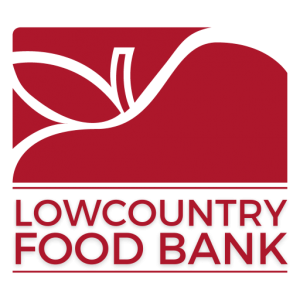Lowcountry Food Bank’s sustainability work rescues nutritious food for neighbors who are food insecure
April 25, 2022LCFB recovered more than 20 million pounds of food last year that might have been otherwise wasted.
Surrounding Earth Day, recognized every year in April, Lowcountry Food Bank (LCFB) is shining a light on how we practice sustainability and promote a decreased carbon footprint, reuse of materials, and recycling, all with the goal of protecting our ecosystem and recovering food to serve our neighbors who are food insecure.
LCFB recovers nutritious, high quality food that might otherwise go to a landfill. In 2021, LCFB recovered more than 14 million pounds of food from grocery stores for our neighbors in the 10 coastal counties of South Carolina we serve.
Each year, LCFB sources more than five million pounds of produce that would otherwise be left in the field by paying a small fee per pound to have it harvested, packed and transported.
LCFB collects, bales, and recycles all clean cardboard food boxes we use. An average bale weighs about 1,000 pounds, and every two bales equals one pine tree or 10,000 sheets of paper. LCFB recycled approximately 120 bales in 2020, saving 600,000 sheets of paper, or 60 trees. LCFB recycled approximately 123 bales in 2021, saving 615,000 sheets of paper, or 61.5 trees.
LCFB sustainability achievements include composting and recycling in our Zucker Family Production Kitchen, which has been in place since it opened in 2010. We use plug-in, electric stand-by truck refrigeration units that reduce our vehicles’ diesel emissions and have made LED lighting upgrades to our facilities that reduce energy use.
Second Helpings – Serving Beaufort, Jasper and Hampton Counties
Second Helpings, a volunteer-driven non-profit organization in Beaufort County, is an entity that LCFB is proud to count as a valuable contributor in the Lowcountry. Second Helpings rescues food from grocery stores and other outlets in Beaufort, Jasper and Hampton counties and delivers it the same day at no cost to food pantries that serve food insecure neighbors. All Second Helpings funding comes from private donations, and the organization is comprised of nearly 99% volunteers.
Second Helpings rescues and distributes more than 3 million pounds of food every year to more than 50 food pantries, soup kitchens, churches and family programs. Their Fill the Need program distributes groceries to the Hilton Head Island workforce that have long bus commutes to work every day from surrounding rural areas and provides nutritious food for them to take home.
Feeding America
Each year, Feeding America and its network of food banks, of which LCFB is a member, rescues around 3.6 billion pounds of food. This represents only a small percentage of food that could have been donated, but ended up in a landfill. In the United States, food waste is estimated at between 30 to 40 percent of the food supply, according to the United States Department of Agriculture.
According the U.S. Environmental Protection Agency, food is the single largest category of material placed in municipal landfills in the United States, where it emits methane, a powerful greenhouse gas. Municipal solid waste landfills are the third-largest source of human-related methane emissions in the U.S., accounting for approximately 14.1 percent of these emissions in 2017.
All the world’s nearly one billion hungry people could be fed on less than a quarter of the food that is wasted in the US, UK and Europe. Eliminating global food waste would save 4.4 million tons of C02 a year, the equivalent of taking one in four cars off the road.
Ways people can reduce food waste at home:
-
- Before shopping, make a shopping list and stick to it.
- Buy only what you can eat before the food spoils.
- Buy from local farmers. Food is fresher and they consume less resources to bring the food to the market.
- In your refrigerator, bring older items to the front so you can consume them first.
- Store fruits and vegetables properly to extend their shelf life.
- Cut up leftover carrots, herbs, onions, and other vegetables and freeze them. You can use them in recipes or to make a vegetable stock.
- Date the food in your freezer so you’ll easily see when they’re nearing the end of their shelf life.
- Donate unused food to a local pantry or food kitchen. You can feed a lot of hungry people this way.
- When eating out, bring home leftover food and eat it!
- Try Composting!
To learn more about Lowcountry Food Bank, visit our website at lowcountryfoodbank.org.
About the Lowcountry Food Bank: Feed. Advocate. Empower.
The Lowcountry Food Bank serves the 10 coastal counties of South Carolina and distributed more than 40 million pounds of food in 2021. The Lowcountry Food Bank helps fight hunger by distributing food to more than 250 partner agencies including on-site meal programs, homeless shelters and emergency food pantries. The Lowcountry Food Bank advocates on behalf of those who experience hunger and helps empower people to make healthy and nutritious food choices. For more information, visit the Lowcountry Food Bank website.
About Second Helpings
Second Helpings is a nonprofit food rescue organization striving to eliminate hunger in the South Carolina Lowcountry. We collect and distribute food which would have otherwise ended up in landfills. Approximately 325 volunteers delivered 3.2 million pounds of food in 2021 to 54 agencies in Beaufort, Jasper, and Hampton counties. The organization is celebrating its 30th anniversary in 2022. Second Helpings is a United Way Agency. For more information, visit www.secondhelpingslc.org, find us on Facebook or call 843-689-3689.
About Feeding America
Feeding America® is the largest hunger-relief organization in the United States. Through a network of more than 200 food banks, 21 statewide food bank associations, and over 60,000 partner agencies, food pantries and meal programs, we helped provide 6.6 billion meals to tens of millions of people in need last year. Feeding America also supports programs that prevent food waste and improve food security among the people we serve; brings attention to the social and systemic barriers that contribute to food insecurity in our nation; and advocates for legislation that protects people from going hungry. Visit www.feedingamerica.org, find us on Facebook or follow us on Twitter.
To learn more about how you can join the fight against hunger, visit the Lowcountry Food Bank website.

















